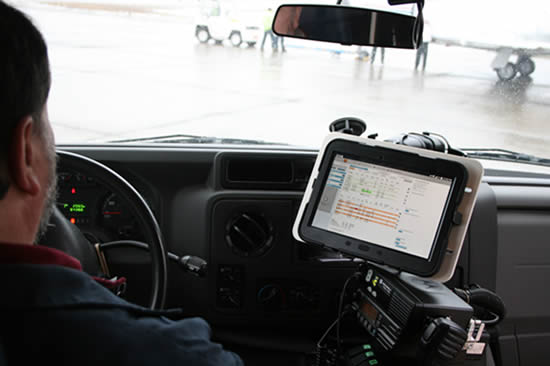| Bangor International Airport (BGR), Maine, is the first in North America to install FBO One, a fully
integrated and intuitive on-line aircraft handling and fuel management program.
The airport’s GA traffic will benefit from faster turnaround times following the installation, which will also mean much greater efficiencies for its ground handling and back office staff, as well as an enhanced customer experience.
The closest US port of entry from Europe, BGR is one of a small number of airports to own its FBO, while also owning and operating a 2.9 million gallon capacity fuel farm. That makes it a sizeable regional player, capable of meeting the needs of every plane that comes its way, from light aircraft and corporate jets to the giant Antonov An-225, as well as regular scheduled and diverted commercial aircraft.
“With the new program we will be able to accept airside credit card payments for fuel using
hand-held tablets on which the FBO One system is also accessible,” says assistant airport director
James
Canders. “This will save pilots the hassle of waiting while we process their payment in the office before returning it to them. This will now be a simple ‘gas and go’ operation,” he adds.
 |
|
FBO
One Tablet |
Fuel temperature conversion is critical, especially when just a one percent variation in outdoor temperature can make such a substantial difference to volumes. Developed by Amsterdam Software, FBO One is thought to be the only program that meets BGR’s needs in this regard, while also integrating with the airport’s existing fuel truck meters.
BGR’s ground handling services include GPU, air starts, lavatory and water service, aircraft cleaning, air conditioning and heat, bottled oxygen, preheats and arrangements for airframe maintenance.
On-field aircraft maintenance services are available around the clock, as is de-icing for any type of aircraft with types I and IV fluid. Dispatch services and flight coordination are also available, while BGR is open 24/7 for refueling, aircraft servicing, federal inspection, passenger services and all transit needs. Together, all these services provide a huge amount of planning, paperwork and communications between all parties and departments involved.
“Keeping track of the bigger picture is vital,” says
Ries
Vriend, Amsterdam Software’s CEO. “One huge benefit of FBO One is the elimination of redundant data capture and data re-entry. The program connects and facilitates the workflow of the FBO customer service representatives, dispatch, ramp staff, the accounting back office and airport management.”
Prior to its installation BGR’s daily flight programs were compiled by the dispatch department using a stand-alone tool. These overviews were then distributed by fax and e-mail to the various stakeholders at the airport, such as the FBO’s service representatives and line staff.
During the day, these overviews could become outdated quickly, while maintaining and managing the flow of information also proved problematical. Now, with FBO One, all flight reservations are kept up to date centrally, providing all stakeholders with quick access and greater efficiency.
When aircraft arrive and remain parked overnight, FBO One tracks their current stand and automatically applies the ramp fees to the invoice, based on the customer’s contract rates and the aircraft type. Invoicing has also been made easier. Before its installation invoice data had to be
re-entered manually, while FBO One invoices are produced automatically and exported to
Sungard, the accounting system used by the City of Bangor, which owns and operates the airport. This saves considerable time and eliminates unreliable paper trails. |